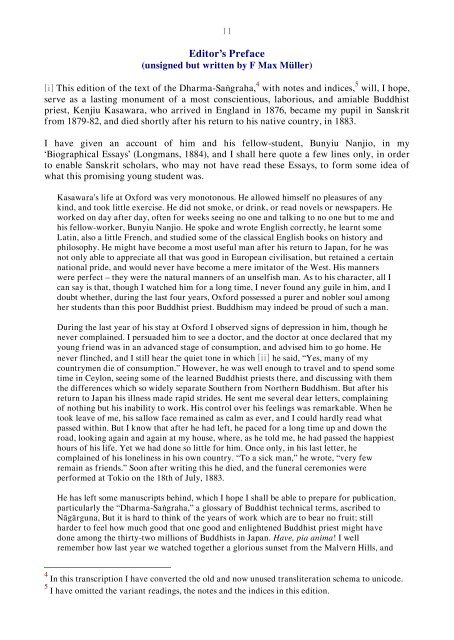Dharmasangraha The Dharma Collection
A Sanskritised Prakrit and English line by line (interlinear) edition of this important collection of Dharma terms and lists, from after the rise of the Mahāyāna.
A Sanskritised Prakrit and English line by line (interlinear) edition of this important collection of Dharma terms and lists, from after the rise of the Mahāyāna.
You also want an ePaper? Increase the reach of your titles
YUMPU automatically turns print PDFs into web optimized ePapers that Google loves.
11<br />
Editor’s Preface<br />
(unsigned but written by F Max Müller)<br />
[i] This edition of the text of the <strong>Dharma</strong>-Saṅgraha, 4 with notes and indices, 5 will, I hope,<br />
serve as a lasting monument of a most conscientious, laborious, and amiable Buddhist<br />
priest, Kenjiu Kasawara, who arrived in England in 1876, became my pupil in Sanskrit<br />
from 1879-82, and died shortly after his return to his native country, in 1883.<br />
I have given an account of him and his fellow-student, Bunyiu Nanjio, in my<br />
‘Biographical Essays’ (Longmans, 1884), and I shall here quote a few lines only, in order<br />
to enable Sanskrit scholars, who may not have read these Essays, to form some idea of<br />
what this promising young student was.<br />
Kasawara’s life at Oxford was very monotonous. He allowed himself no pleasures of any<br />
kind, and took little exercise. He did not smoke, or drink, or read novels or newspapers. He<br />
worked on day after day, often for weeks seeing no one and talking to no one but to me and<br />
his fellow-worker, Bunyiu Nanjio. He spoke and wrote English correctly, he learnt some<br />
Latin, also a little French, and studied some of the classical English books on history and<br />
philosophy. He might have become a most useful man after his return to Japan, for he was<br />
not only able to appreciate all that was good in European civilisation, but retained a certain<br />
national pride, and would never have become a mere imitator of the West. His manners<br />
were perfect – they were the natural manners of an unselfish man. As to his character, all I<br />
can say is that, though I watched him for a long time, I never found any guile in him, and I<br />
doubt whether, during the last four years, Oxford possessed a purer and nobler soul among<br />
her students than this poor Buddhist priest. Buddhism may indeed be proud of such a man.<br />
During the last year of his stay at Oxford I observed signs of depression in him, though he<br />
never complained. I persuaded him to see a doctor, and the doctor at once declared that my<br />
young friend was in an advanced stage of consumption, and advised him to go home. He<br />
never flinched, and I still hear the quiet tone in which [ii] he said, “Yes, many of my<br />
countrymen die of consumption.” However, he was well enough to travel and to spend some<br />
time in Ceylon, seeing some of the learned Buddhist priests there, and discussing with them<br />
the differences which so widely separate Southern from Northern Buddhism. But after his<br />
return to Japan his illness made rapid strides. He sent me several dear letters, complaining<br />
of nothing but his inability to work. His control over his feelings was remarkable. When he<br />
took leave of me, his sallow face remained as calm as ever, and I could hardly read what<br />
passed within. But I know that after he had left, he paced for a long time up and down the<br />
road, looking again and again at my house, where, as he told me, he had passed the happiest<br />
hours of his life. Yet we had done so little for him. Once only, in his last letter, he<br />
complained of his loneliness in his own country. “To a sick man,” he wrote, “very few<br />
remain as friends.” Soon after writing this he died, and the funeral ceremonies were<br />
performed at Tokio on the 18th of July, 1883.<br />
He has left some manuscripts behind, which I hope I shall be able to prepare for publication,<br />
particularly the “<strong>Dharma</strong>-Saṅgraha,” a glossary of Buddhist technical terms, ascribed to<br />
Nāgārguna, But it is hard to think of the years of work which are to bear no fruit; still<br />
harder to feel how much good that one good and enlightened Buddhist priest might have<br />
done among the thirty-two millions of Buddhists in Japan. Have, pia anima! I well<br />
remember how last year we watched together a glorious sunset from the Malvern Hills, and<br />
4 In this transcription I have converted the old and now unused transliteration schema to unicode.<br />
5 I have omitted the variant readings, the notes and the indices in this edition.


















